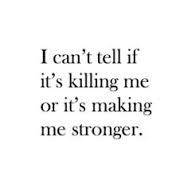Mind & Body Tools to Optimize Your Life

Does watching horror movies strengthen your immune system?
There’s this strange study done where 32 people were exposed to a horror film.
Different biological factors were measured before and after the viewing. The findings were that, among other things, their heart rate and white blood cell count went up.
White blood cells enable people to fight disease and repair the body. The amount of these cells is a marker of how strong your immune system is.
So could we conclude from this research that watching scary movies strengthens our immune system?
Contents
There’s probably truth to that statement
After all, as Nietschze said: “That which does not kill us, makes us stronger”. Sometimes we have to challenge ourselves, only to overcome that challenge. Putting some stress on ourself helps us to grow stronger physically, mentally and emotionally.
Without challenge, no growth
We can try to shield ourselves from “stressors” all the time, but that wouldn’t help us to become better at something and improve.
Take for instance trauma survivors (physical and/or emotional trauma). Some of these survivors have reported positive changes and enhanced personal development. This is called “post traumatic growth” (PTG).

It’s all about balance
Of course, we have to choose our challenges wisely, because if the challenge is too big, we will succumb to the stressor. The stress has to be just enough to force us to reach a higher level in ourselves.
Too little and it doesn’t challenge us, and with too much stress we just fail and go on a downward spiral, not being able to get on top.
Horror teaching us to deal with our fears?
The same goes for the “stress” of a good horror movie.
It might be that watching such a film could be training for the body and psyche, learning us to stay more relaxed and levelheaded in scary or dangerous situations.
Even though the movie isn’t real, and we know on a conscious level that it isn’t, it still feels true to our subconscious. Otherwise we would have no signs of stress.
And that’s maybe why being exposed to such a movie can be effective as a learning tool. It’s pretty real, but just not as intense as a real life situation. You could say the impact is not too much, but just enough.
(But of course, it can still be too much for some. Depends on the person.)
Your DNA loves horror movies
In the article “Your DNA loves horror movies“, a Danish researcher says:
“It’s actually just like other mammals’ young, who fight for fun because it makes evolutionary sense later on in life when they will need to fight to the death”
and:
“We use fiction as an ‘emotional simulator’ to broaden our horizons. Horror fiction exercises our reactions to what’s terrible and frightening.”
of course, too much is too much
“Even if you are young and healthy, watching horror movies can mess with you in ways you didn’t expect. When you get scared your adrenaline and cortisone levels spike.” – source
Adrenalin and cortisone are the stress hormones. In fact, that’s why people are watching thrillers and horror in the first place. They want to experience the thrill caused by these hormones.
And, after the thrill, they want to find relaxation and relief again. And then the cycle starts over again. Seems to be a human trait.
Like two sides of a coin.
But where is the positive side?
But the problem is, in today’s society, there’s so much violence and fear being portrayed in the first place. And on top of that, everything – whether in movies or in real life – needs to be quicker and go faster. The pace is picking up. Every new generation is raised in a pace of life that’s quicker than the generation before them. That’s more stressors and thus more stress hormones.
But where’s the slowness? The peace? It looks like many people have no patience any more and can’t stand it when something goes slow.
After all, for a good balance, next to the thrill, and the fear, the other half of the equation needs to be represented as well: peace, beauty, love.
Feeding yourself positive messages
I’ve been staying away from watching horror movies, and in general even the news. After all, the images I feed myself have an impact on my subconsious and thus my life. And why would I feed myself negativity? I prefer to nourish myself with healthy images and activities.
A test to see how balanced you are
On the other hand, I remember when, about ten years ago, I watched the movie “the exorcist” with the specific intention to explore the fears I still had, and to see if I could face and overcome them.
I consciously meditated after the film, sitting for a few hours in a dark room just before bedtime, to see if I could let the fears go and keep the peace inside.
It was hard 🙂
My mind was constantly trying to scare me – again, even though the movie was long over. I guess I had it coming to me, that’s what I get for watching ‘fear’.
Face your fears
But doing this makes sense to me, still. I believe in facing our fears, even to the point of reliving traumatic experiences to heal them.
As the previously quoted article warns:
“this in turn can dredge up repressed traumatic memories”
Well, I’d say that’s a good thing. Don’t avoid your fears. Otherwise repressed memories will surface at a later time anyway, or find its way out in subtle ways.
If we had a look at our subconscious we’d probably be horrified what we find there anyway. Whether we watch thrilling or horror movies or not. The movies are just representations of our subconscious minds.
So maybe someday I might experiment with horror again. (But to be honest, nowadays I instinctively don’t want involve myself in all this made-up, bigger-than-life and grotesque imaginations… I can’t see the point. Got enough stressors in my life as it is… 🙂 )
So I guess it’s a fine line between facing our fears and feeding ourselves negativity…
Do you watch horror films?
Main image:
“Scary clown” by Graeme Maclean. Licensed under CC BY 2.0 via Wikimedia Commons.







Sorry, comments are closed for this post.